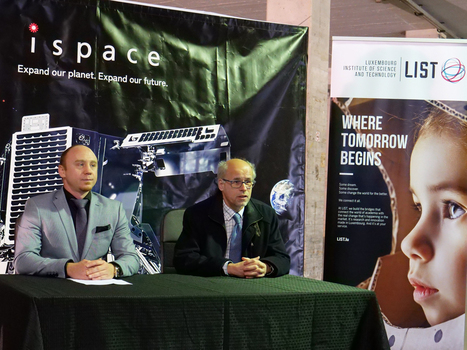LIST AND ISPACE EUROPE ON TRACK TOWARDS LUNAR RESOURCE PROSPECTING
PUBLISHED ON 28/12/2018
In 2017, the Luxembourg Institute of Science and Technology (LIST) and ispace Europe – a Japanese lunar exploration company whose European headquarters are in Luxembourg – formed a strategic partnership with the aim of developing a first mission to prospect for resources on the Moon and, in particular, to detect and analyze water. A year later, initial research work on the development of an instrument capable of detecting water in situ at a lunar pole and performing an initial mapping of the water distribution in a polar region truly began. October 2018 saw the start-up of the dedicated FOCAL1DS - "Space Deployable 1-Dimensional Focal Plane Detector for Magnetic Sector Mass Spectrometer" research project, funded by the Luxembourg National Research Fund (FNR), which will run for two years.
A COMPACT MOBILE MASS SPECTROMETER ON THE LUNAR SURFACE
With the aim of increasing human presence in space while at the same time using the resources available on the Moon, ispace Europe plans to detect and analyze the potential water resources present on the Moon. To achieve this, a compact mobile mass spectrometer roving the lunar surface is vital. But while ispace Europe develops lunar exploration technologies, these still need to be coupled with a high-performance compact mass spectrometer that is specially adapted for space applications.
And LIST has precisely the mass spectrometry technology that is proven to be effective for such applications. Through the recently completed MS-SPACE - "Development and benchmarking of a compact mass spectrometer for space applications" project, also funded by the FNR, its researchers were able to adapt and further develop their own mass spectrometry technology for space applications in partnership with NASA's Ames Research Center (USA). After two years of research, the technology – deployable in space to meet NASA's requirements – revealed its full potential.
Learn more / En savoir plus / Mehr erfahren:
https://www.scoop.it/t/luxembourg-europe/?&tag=Space



 Your new post is loading...
Your new post is loading...








LIST AND ISPACE EUROPE ON TRACK TOWARDS LUNAR RESOURCE PROSPECTING
PUBLISHED ON 28/12/2018
In 2017, the Luxembourg Institute of Science and Technology (LIST) and ispace Europe – a Japanese lunar exploration company whose European headquarters are in Luxembourg – formed a strategic partnership with the aim of developing a first mission to prospect for resources on the Moon and, in particular, to detect and analyze water. A year later, initial research work on the development of an instrument capable of detecting water in situ at a lunar pole and performing an initial mapping of the water distribution in a polar region truly began. October 2018 saw the start-up of the dedicated FOCAL1DS - "Space Deployable 1-Dimensional Focal Plane Detector for Magnetic Sector Mass Spectrometer" research project, funded by the Luxembourg National Research Fund (FNR), which will run for two years.
A COMPACT MOBILE MASS SPECTROMETER ON THE LUNAR SURFACE
With the aim of increasing human presence in space while at the same time using the resources available on the Moon, ispace Europe plans to detect and analyze the potential water resources present on the Moon. To achieve this, a compact mobile mass spectrometer roving the lunar surface is vital. But while ispace Europe develops lunar exploration technologies, these still need to be coupled with a high-performance compact mass spectrometer that is specially adapted for space applications.
And LIST has precisely the mass spectrometry technology that is proven to be effective for such applications. Through the recently completed MS-SPACE - "Development and benchmarking of a compact mass spectrometer for space applications" project, also funded by the FNR, its researchers were able to adapt and further develop their own mass spectrometry technology for space applications in partnership with NASA's Ames Research Center (USA). After two years of research, the technology – deployable in space to meet NASA's requirements – revealed its full potential.
Learn more / En savoir plus / Mehr erfahren:
https://www.scoop.it/t/luxembourg-europe/?&tag=Space